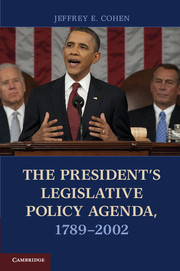Book contents
- Frontmatter
- Contents
- List of Figures
- List of Tables
- Introduction
- Chapter 1 The President's Legislative Policy Agenda
- Chapter 2 Studying Agenda Building
- Chapter 3 A Theory of Presidential Agenda Building and the Congressional Response
- Chapter 4 The Size of the President's Agenda, 1789–2002
- Chapter 5 The Substantive Content of Presidential Agendas
- Chapter 6 Divided Government and Presidential Policy Moderation
- Chapter 7 From the White House to Capitol Hill
- Chapter 8 Conclusion
- Bibliography
- Index
Chapter 2 - Studying Agenda Building
Published online by Cambridge University Press: 05 November 2012
- Frontmatter
- Contents
- List of Figures
- List of Tables
- Introduction
- Chapter 1 The President's Legislative Policy Agenda
- Chapter 2 Studying Agenda Building
- Chapter 3 A Theory of Presidential Agenda Building and the Congressional Response
- Chapter 4 The Size of the President's Agenda, 1789–2002
- Chapter 5 The Substantive Content of Presidential Agendas
- Chapter 6 Divided Government and Presidential Policy Moderation
- Chapter 7 From the White House to Capitol Hill
- Chapter 8 Conclusion
- Bibliography
- Index
Summary
This chapter reviews the literature on agenda building, with special emphasis on the president's legislative policy agenda. The existing research on presidential agenda building, as well as agenda building in general, provides the building blocks for this study. As this review details, however, the existing literature is not without its limitations.
Research on agenda building has blossomed in recent decades. Among the important and highly influential studies on the general question of the agenda building process include Bachrach and Baratz (1963), Cobb and Elder (1972), Kingdon (1995), Light (1982, 1991), Baumgartner and Jones (1993, 2009), and Jones and Baumgartner (2005). That research has provided some of the terminology that has come to define how we study the agenda and the agenda-building process, such as Bachrach and Baratz's nondecisions; Cobb and Elder's distinction between the systemic and institutional agenda; Kingdon's concepts of the active agenda, and the policy, political, and problem streams; and Baumgartner and Jones's policy venues, to list just a few of the central ideas.
The rational choice literature has also grappled with agenda setting but generally in a more formalized sense of an agenda setter who acts as a gatekeeper who controls access to decision-making venues and the sequence of voting on alternatives. The theory of committees and the median voter theorem provide the underpinnings of this brand of agenda-setting research, with Romer and Rosenthal (1978) the seminal work in this vein. Krehbiel’s (1998) pivotal politics theory, as well as Cameron’s (2000) veto bargaining model, and Canes-Wrone’s (2006) strategic “going public” model, among others, grew out of this research tradition.
- Type
- Chapter
- Information
- The President's Legislative Policy Agenda, 1789–2002 , pp. 34 - 47Publisher: Cambridge University PressPrint publication year: 2012

